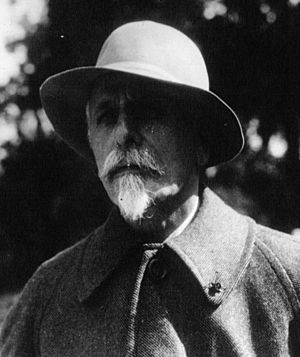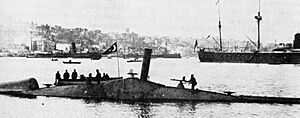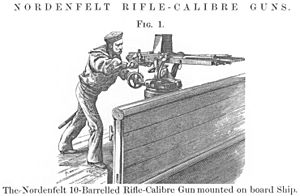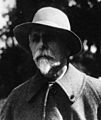Basil Zaharoff facts for kids
Quick facts for kids
Basil Zaharoff
|
|
|---|---|

Basil Zaharoff in 1928
|
|
| Born |
Vasileios Zacharias
October 6, 1849 |
| Died | November 27, 1936 (aged 87) |
| Nationality | Ottoman, Greek, naturalised French |
| Occupation | Arms dealer, industrialist |
| Known for | Vickers |


Sir Basil Zaharoff (born Vasileios Zacharias; October 6, 1849 – November 27, 1936) was a Greek arms dealer and industrialist. He was one of the richest people in the world during his lifetime. People called Zaharoff a "merchant of death" and a "mystery man of Europe."
He became successful by using clever and sometimes aggressive business tactics. These included selling weapons to different sides in conflicts. He sometimes even delivered machines that didn't work well. He was also good at using newspapers to criticize his business rivals.
Zaharoff was friends with many powerful political leaders. These included British Prime Minister David Lloyd George and Ottoman Sultan Abdul Hamid II.
The writer George Bernard Shaw based a character in his play Major Barbara on Zaharoff. He also likely inspired Ian Fleming's fictional James Bond villain Ernst Stavro Blofeld.
Contents
Early Life and First Steps in Business
Vasileios Zacharias was born in 1849 in Muğla, a town in the Ottoman Empire. His family was Greek. They had lived in Russia for over 20 years as exiles. While there, they took the name Zaharoff.
His family returned to the Ottoman Empire in the 1840s. By 1855, they were back in Constantinople's Greek neighborhood.
Vasileios' first job was as a tour guide. He also worked with Constantinople's fire brigades. Later, he moved to Athens. There, he met a political journalist named Etienne Skouloudis.
Skouloudis helped Zaharoff get a job. On October 14, 1877, Zaharoff became an agent for the arms manufacturer Thorsten Nordenfelt. This was the start of his amazing career. The countries in the Balkan states, Turkey, and Russia were often unstable. This created many chances for Zaharoff to sell weapons.
How Basil Zaharoff Became an Arms Dealer
Zaharoff did not only sell weapons at first. He worked as a shipping agent in Ireland. He also spent time in the United States. There, he worked as a salesman.
In 1885, he married Jennie Billings. He was known for using clever, sometimes tricky, methods to get what he wanted.
Zaharoff sold weapons to many countries. These included Great Britain, Germany, the Russian and Ottoman Empires, Greece, Spain, Japan, and the United States. He was very important in selling military equipment. This included famous weapons and even the first working submarine.
He worked for Vickers, a large weapons company, from 1897 to 1927.
Selling Submarines and Clever Tactics
From 1886 to 1889, Zaharoff worked on developing a submarine for his business.
One of his most famous sales was the Nordenfelt I. This was a steam-powered submarine that didn't work very well. The US Navy even said it made "dangerous and eccentric movements." Major countries weren't interested in it. But smaller nations, who wanted to seem important, were.
Zaharoff sold the first Nordenfelt I to Greece. He promised them easy payment terms. Then, he convinced Turkey that the Greek submarine was a threat. So, he sold two submarines to Turkey. After that, he told Russia there was a new threat in the Black Sea. They bought two more.
None of these submarines were ever used in battles. Their steam engines were not good enough for underwater travel. They also had problems staying stable.
Around this time, a Spanish inventor named Isaac Peral designed a much better submarine. It could move underwater well and fire torpedoes. Peral's submarine used electricity and had many advanced features.
Zaharoff quickly learned about Peral's invention. He tried to buy the patent for a part of the submarine. Peral refused.
Zaharoff then used his influence to cause problems between Peral and the Spanish government. This led to the government not approving Peral's submarine. This was a missed chance for Spain.
Zaharoff visited Spain many times. He wanted to stop Peral's submarine, sell weapons to Spain, and buy a Spanish weapons factory. He succeeded in all three. He made many powerful friends among Spanish politicians and military leaders. These friends helped him achieve his business goals.
He bought a Spanish weapons company called Euskalduna. It was renamed "Placencia de las Armas Co. Ltd." This company later sold weapons to the Spanish government that were not useful during the 1898 War.
After this, another company, Sociedad Española de Construcción Naval, which was part of Vickers, got the exclusive right to build ships for the Spanish Navy.
More Business Strategies
Zaharoff was known for using clever, sometimes tricky, methods to get what he wanted. He was paid large amounts for deals between foreign companies and the Spanish government. For example, he received a 5 to 7% commission on American submarines sold to Spain.
In 1890, the Maxim-Nordenfelt partnership ended. Zaharoff chose to stay with Maxim. He used his commissions to buy shares in Maxim's company. Soon, he was an equal partner, not just an employee.
By 1897, Vickers, a huge arms company, bought Maxim's company. Zaharoff received a lot of money and shares. He kept buying more Vickers shares. After Maxim retired, Zaharoff joined Vickers' board of directors.
In the early 1900s, many European armies were modernizing. Germany and the United Kingdom wanted better navies. Vickers and Zaharoff were happy to supply both sides. After its defeat by Japan in 1905, the Russian Navy also needed new equipment. Russia wanted its own industries to rebuild. So, Zaharoff built a large Russian arms factory near Tsaritsyn for Vickers.
Old Russian records from after World War I showed some of the arms industry's tactics. In 1907, a Vickers-controlled company in Germany sent a letter. It suggested sending news to the French press. These news stories would say that France needed to improve its military because Germany was re-arming. These French newspaper articles led to Germany increasing its military spending. All of this helped Zaharoff's business.
Basil Zaharoff During World War I
Before World War I, Zaharoff's wealth grew even more. He bought a bank, L'Union Parisienne des Banques, which helped him control his money deals. He also took control of Excelsior, a popular French newspaper. This meant he could make sure the newspaper printed good things about the arms industry.
To gain public approval, he started a retirement home for French sailors. He also funded a special study program in Aerodynamics at the University of Paris. This brought him more honors.
In April 1914, Zaharoff gave £20,000 to help France prepare for the 1916 Olympic Games in Berlin. The games were later canceled because of the war.
On July 31, 1914, Zaharoff was made a Commander of the Legion of Honour.
In March 1914, Vickers announced a new period of success. During the war, Vickers made many ships, submarines, cannons, steel, mines, torpedoes, airplanes, and machine guns. By 1915, Zaharoff was very close to David Lloyd George and Aristide Briand. It is said that Zaharoff once left a million francs for war widows on Briand's desk.
One of Zaharoff's jobs during the war was to get Greece to join the Allies. This would help the eastern front. This seemed hard because King Constantine was related to the German Kaiser. Zaharoff set up a news agency in Greece to spread pro-Allied news. Within months, King Constantine was removed from power. Prime Minister Eleftherios Venizelos, who supported the Allies, took over.
In 1917 and 1918, Zaharoff met with Ottoman leaders. The British hoped he could convince them to make a separate peace and leave World War I.
By the end of World War I, The Times newspaper estimated that Zaharoff had spent £50 million to help the Allied cause.
After the War
After World War I, Zaharoff became involved in the affairs of smaller countries. He wanted to make sure Greece received a good share from the defeated Turkey. In 1920, he gave a huge sum of money to the Greek State. Zaharoff convinced Venizelos to attack Turkey. The Greek army had some early success but was eventually pushed back.
In the elections that followed, Venizelos had to flee. But Zaharoff stayed and convinced the new King to attack Turkey again. However, Mustafa Kemal was now in charge of Turkey, and this attack failed. Zaharoff's war actions were not well-received by newspapers in Paris and London.
Zaharoff also got involved in the oil business in October 1920. He helped start a company that later became part of British Petroleum. He believed the oil business had a great future.
He also had a connection with Prince Louis II of Monaco. This led him to buy the Société des Bains de Mer. This company ran the famous Monte Carlo Casino. The casino was the main source of money for Monaco. Zaharoff managed to make the casino profitable again. He also convinced Clemenceau to protect Monaco's rights in the Treaty of Versailles.
Personal Life and Philanthropy
Zaharoff was very interested in aviation. He gave money and support to aviation pioneers in Great Britain, France, and Russia. He encouraged Hiram Maxim to build a flying machine. He even claimed he and Maxim were the first people to be lifted off the ground when Maxim tested his first "flying machine" in 1894.
In September 1924, Zaharoff, at 74, married María del Pilar Antonia Angela Patrocinio Fermina Simona de Muguiro y Beruete. She was known as one of the richest women in Spain.
About 18 months after they married, she passed away. After this, he began selling his businesses. He started writing his life story, but he reportedly burned the manuscript.
Zaharoff's country house, the Château de Balincourt, was near Paris. It was full of art and was one of the most beautiful houses in France.
Zaharoff was a generous supporter of many organizations:
- He funded special study programs in Aviation at the University of Paris, Saint Petersburg State University, and Imperial College, London.
- He funded special study programs in French Literature at Oxford University and English Literature at the University of Paris.
- He gave £20,000 to fix up the monkey house at the Paris Zoo.
- He contributed £125,000 to study aviation problems in England.
- He helped build a War Hospital at Biarritz.
- He donated money to build the Greek Embassy in Paris.
- He helped people affected by an earthquake in Corinth, Greece.
- He established the Institut Pasteur à Athènes (a research institute) in 1919.
Honours
 Grand Cross, Legion of Honour
Grand Cross, Legion of Honour Honorary Knight Grand Cross, Order of the Bath (he was allowed to use the title "Sir")
Honorary Knight Grand Cross, Order of the Bath (he was allowed to use the title "Sir") Honorary Knight Grand Cross, Order of the British Empire
Honorary Knight Grand Cross, Order of the British Empire Grand Cross, Order of the Redeemer
Grand Cross, Order of the Redeemer
See also
 In Spanish: Basil Zaharoff para niños
In Spanish: Basil Zaharoff para niños
- Vickers-Armstrongs
- Legion of Honour
- List of Legion of Honour recipients by name (Z)
- Legion of Honour Museum
Images for kids
 | Charles R. Drew |
 | Benjamin Banneker |
 | Jane C. Wright |
 | Roger Arliner Young |


